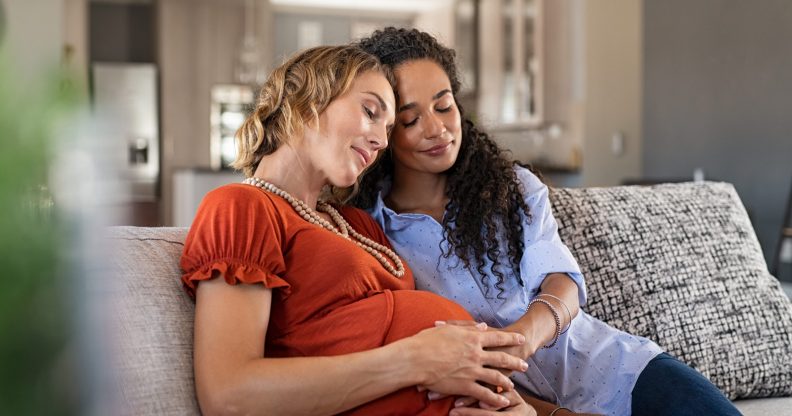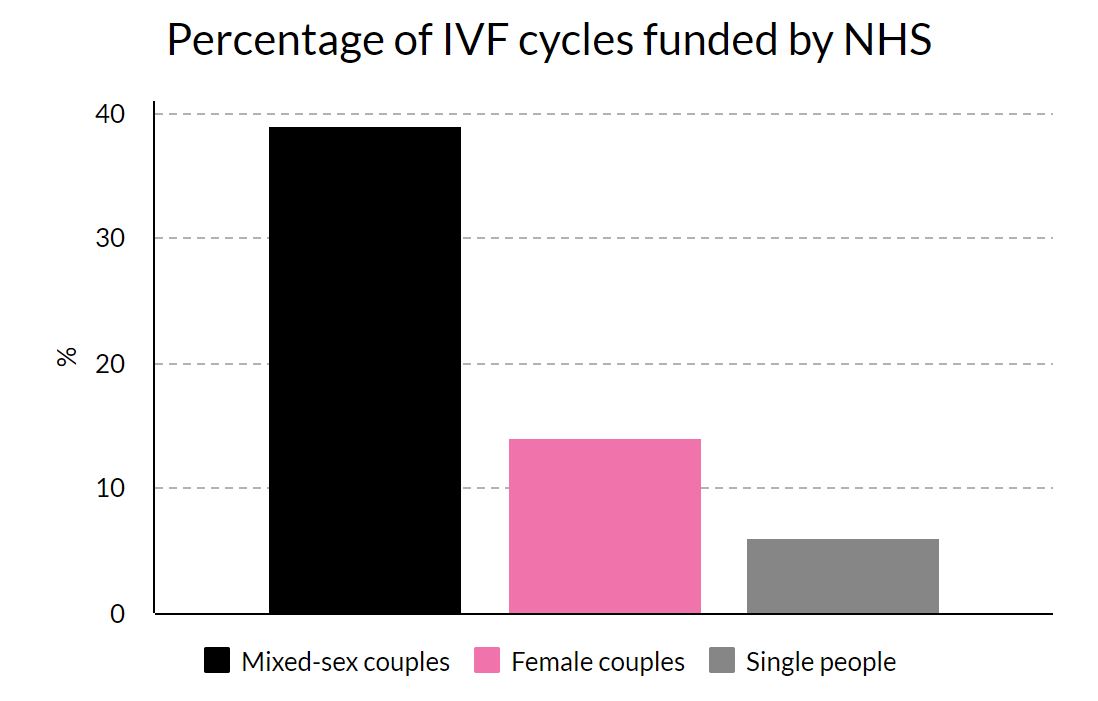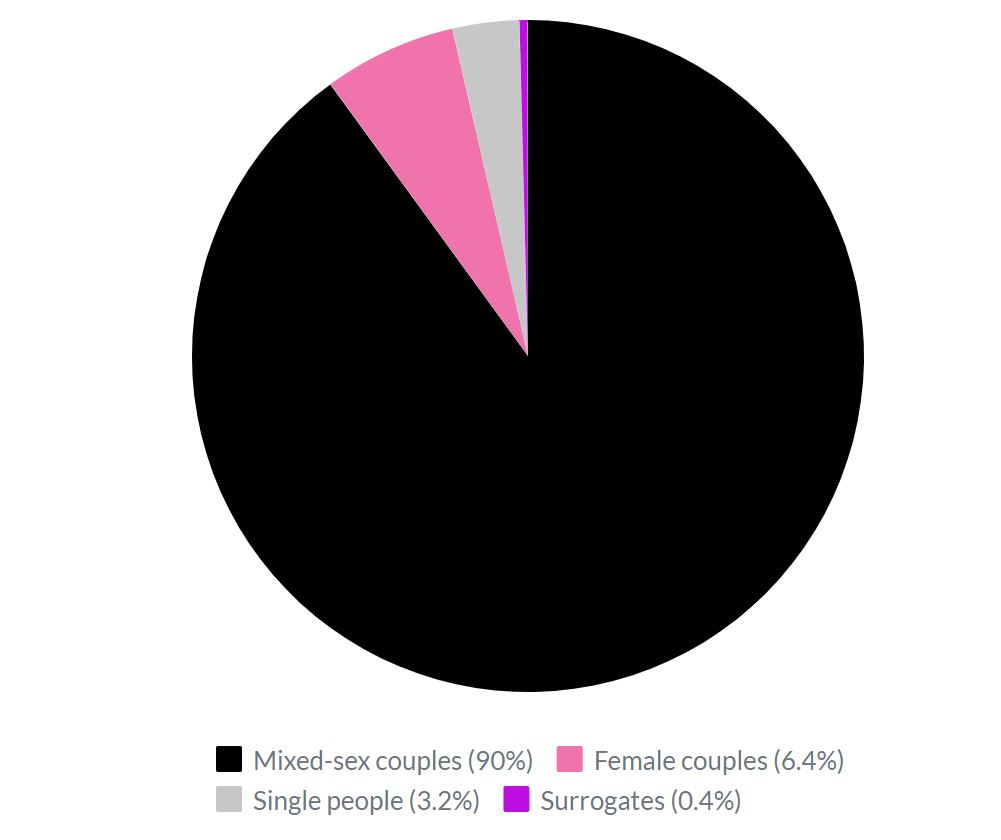Lesbians resort to ‘egg sharing’ to afford IVF treatment as archaic NHS rules continue to discriminate against queer couples

A married lesbian couple has won a Hong Kong court victory to both be recognised as their child’s parent in an IVF case. (Envato Elements)
Lesbians turning to IVF to start families are much less likely to have access to NHS funding than straight couples seeking the same treatment.
A report from the UK’s fertility regulator, the Human Fertilisation and Embryology Authority (HFEA) published on Tuesday (September 22) shines a light on the shocking disparity in access to funded IVF.
It found that 39 per cent of IVF cycles for mixed-sex couples were NHS-funded, but just 14 per cent of IVF cycles for female couples received NHS funding.

Female couples are much less likely to get NHS funding for IVF
IVF funding rules are set locally and vary widely across the UK, leading to criticism of a “postcode lottery” for couples hoping to start a family.
Many NHS trusts require couples to have unsuccessfully attempted to start a family before they can receive NHS-funded treatment.
For mixed-sex couples this generally means having sex, which is free, but for lesbians, the requirements can mean paying to go through several rounds of costly private fertility treatment before becoming eligible for any NHS-funded cycles at all.
The disparity is drastically worse in some parts of the UK than others. In the South East of England, just 3.4 per cent of lesbians receiving IVF had NHS funding, compared to 5.7 per cent in London, 13.2 per cent in the East Midlands, 21.6 per cent in Wales and 39.7 per cent in Scotland.
Jessica Holden, senior policy officer at Stonewall, said: “Questions should be raised regarding the disparity in funding for IVF cycles, to address the current inequalities and provide equal access to fertility treatment for female same-sex couples.”
Lesbian couples are resorting to ‘egg sharing’ to drive down costs of private IVF.
While they are largely prevented from accessing NHS funding, data suggests that same-sex couples are much more likely to opt for “egg sharing”, the female equivalent of sperm donation, to drive down the cost of the treatment.
The practice sees people undergoing IVF donate some of their collected eggs to the clinic to be used by other patients, usually in return for free or discounted rates on their own.
Egg sharing cycles made up eight per cent of IVF cycles for patients in same-sex relationships, compared to less than one percent for patients in heterosexual relationships.
HFEA notes: “Egg sharing is a serious decision for a patient to make, as it will reduce the number of eggs remaining for their own treatment and means any children born from the donated eggs can contact the sharer when they reach 18.
“The higher proportions of egg sharing cycles for both patients in same-sex relationships and single patients may relate to the fact that these patients have fewer NHS-funded cycles and they likely require the added expense of donor sperm for their treatments.”
Despite disparities, more lesbians are accessing IVF treatments than a decade ago
According to the report, lesbians are increasingly turning to the treatment despite the lack of funding available.
Mixed-sex couples still account for around 90 per cent of all fertility patients, but female couples now account for 6.4 per cent, single patients 3.2 per cent and surrogates 0.4 per cent.
In 2018, the latest year with data on record, 2,151 IVF treatment cycles were recorded for patients in female same-sex relationships, compared to only 320 in 2008.

Female couples now make up more than 6 percent of IVF cycles
HFEA chair Sally Cheshire said: “In recent years we’ve seen changes in the reasons why people are using fertility treatment, with the biggest percentage increases amongst those in female same-sex relationships and single women.
“The increase is still small in terms of patient numbers but reflects an increasing shift in society’s changing attitudes towards family creation and relationships. We hope this report will be used to initiate further discussion around access to fertility treatments for different types of patients.
“Any patient, regardless of their background or partner type should receive high quality, evidence-based treatment to help them create their families.
“We will continue to work with the UK fertility sector to understand who is seeking treatment in the first place and why, and how their experiences differ and, most importantly, how patient services and their experiences could be improved.”
Jessica Holden of Stonewall added: “We’re pleased to see that the number of female same-sex couples using fertility treatment to create families has increased. It is also promising to see a significant increase in the rate of female same-sex couples using not only donor insemination, but also IVF as a fertility treatment option.
“These increases are likely a result of both recent legislative changes, such as equal marriage in 2014, but also changing societal attitudes which have allowed people to feel comfortable being open about who they are, and that they are part of a same-sex family.”
Health Secretary Matt Hancock promised a review of IVF access for same-sex couples at a PinkNews reception in 2019.
A spokesperson for the Department of Health and Social Care told PinkNews : “The level of provision of local health services available to patients, including fertility treatment, is a matter for local healthcare commissioners.
“We are clear there should be equal access across England, and that Clinical Commissioning Groups should commission fertility services in line with NICE fertility guidelines.
“NICE fertility guidelines set out that same sex female couples are entitled the NHS IVF services if they have demonstrated their clinical infertility.”

